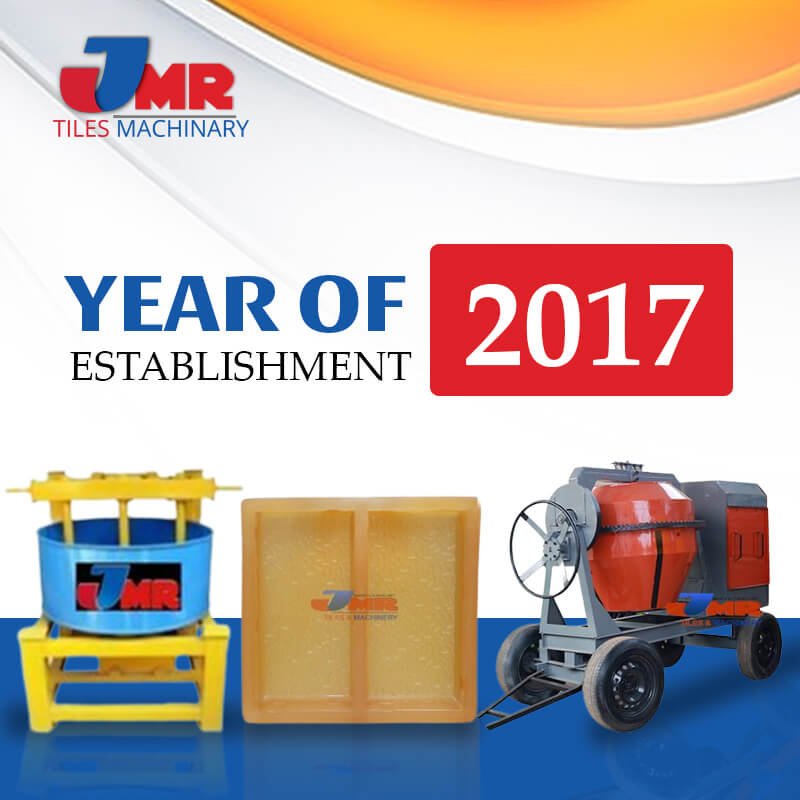Block Paving Machine in Faridabad
About the Machine:
The purpose of a block paving machine is to mass-produce interlocking paving blocks. You may use the machine to make rubber pavers by pouring concrete or other material combination into rubber paver moulds. After filling the moulds with the mixture, they are put on a vibration table to compress the material uniformly. When the blocks have hardened in their moulds, they are treated with a chemical hardener to make them more robust.

Machine Specification:
Dimensions:
The maximum block size that a given machine can generate will depend on its overall dimensions. Most equipment is small and lightweight, making transportation simple.
Power:
Electricity or diesel engines are commonly used to power block paving equipment. The machine’s output power will be proportional to its size and productivity.
Weight:
The machine’s mobility and convenience will be based on how much it weighs.
Production Capacity:
Block paving machines have different outputs based on the type and manufacturer. On the other hand, devices may generate up to 1000 blocks every hour. The manufacturing capacity is affected by block dimensions, block designs, water use, and vibration table velocity.
Equipment Required:
There are a few essential tools needed to run a block paving machine. Among them are:
- Concrete Mixture: The blocks can’t be made without a combination of sand, cement, and water. The manufacturer’s instructions will dictate the relative amounts of each component.
- Rubber Paver Mould: To make interlocking blocks out of concrete, we utilise rubber paver moulds.
- Chemical Hardener: When the blocks have been set, they are treated with a chemical hardener to make them stronger and more long-lasting.
- Colour Pan Mixture: The concrete for the blocks may be coloured using a colour pan combination.
- Vibration Table: A vibration table is employed for uniform packing and distribution of the concrete mixture in the moulds.
- Efficiency: The efficiency of block paving machines is enhanced by the fact that they can mass-produce blocks in a short amount of time.
- Consistency: Vibration tables and rubber paver moulds ensure each block is the same size and form.
- Customisation: With block paving equipment, you may make one-of-a-kind patterns and colours.
- Durability: Because of the chemical hardener, you may now use these blocks in heavily traveled locations without worrying about damage.
How to Use the Machine
-
Prepare the Concrete:
Using the recommended mixing ratio, prepare the concrete.
-
Pour Concrete into Moulds:
Combine the ingredients and then pour them into the rubber paver moulds.
-
Secure Moulds to Vibration Table:
Ensure the moulds are securely fastened to the vibration table before turning on the machine.
-
Drying Time:
Let the blocks dry for the suggested amount of time.
-
Use Chemical Hardener:
First, use the chemical hardener to remove the blocks from the moulds.
-
Ensure Blocks are Dry:
Before utilizing the blocks for paving, make sure they are completely dry.
Important Machine Safety Instructions:
-
Put on Safety Equipment:
Protect yourself from the machine’s dust and debris by wearing gloves, safety goggles, and a dust mask.
-
Refer to Manufacturer’s Manual:
You must always use the equipment by the manufacturer’s guidelines. Damage to the system or harm to the user might result from improper usage.
-
Keep the Machine Clean:
Avoid malfunction by cleaning the equipment free of dust and dirt.
-
Operate in Well-Ventilated Space:
Inhaling the machine’s dust and fumes is risky business. While using the equipment, do it only in a well-ventilated environment or while wearing a respirator.
-
Turn Off the Machine:
To avoid inadvertently turning on the equipment, you should always disconnect it after you use it.
Maintenance of the Machines:
-
Check Oil Levels:
Oil levels in the engine and transmission should be checked often and replenished as required.
-
Clean the Machine:
Keep the machine regularly clean to avoid the accumulation of dust and dirt.
-
Inspect the Vibration Table:
Inspecting the vibration table for any indications of wear regularly and repairing worn or broken components is important.
-
Check Rubber Paver Moulds:
You should inspect rubber paver moulds for wear and damage before use and replace worn or broken moulds.
-
Schedule Regular Servicing:
Ensure the machine is in excellent operating condition by being serviced regularly by a trained professional.
If you’re in the market for a dependable block paving machine, look no further than the selection provided by JMR Tiles Company. Get in touch with us right away if you’re interested in our offerings.
